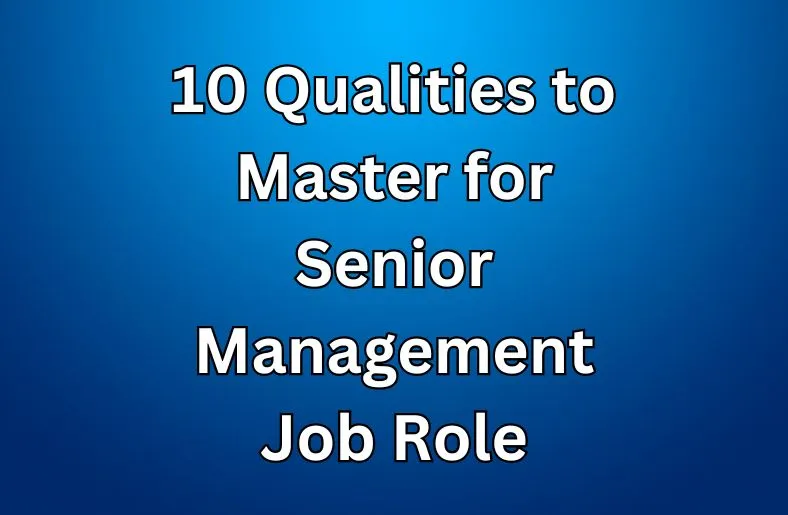In the ever-evolving landscape of senior management, excelling requires more than experience and industry knowledge. As businesses face unprecedented challenges and opportunities, those aspiring to leadership roles must cultivate diverse skills and attributes. From strategic vision and effective communication to emotional intelligence and adaptability, mastering these qualities can set you apart as a formidable leader. This blog delves into the ten essential qualities crucial for anyone aiming to thrive in a senior management position, offering insights and practical tips to help you elevate your career to the next level.
Senior management skills are crucial for climbing the corporate ladder, encompassing strategic thinking, leadership, decision-making, and effective communication—key elements for organizational success. These skills enable professionals to manage complex challenges, inspire teams, and align operations with the company’s vision and goals. Pursuing a senior management program IIM (Indian Institute of Management) can significantly aid in developing these competencies. IIM’s programs offer rigorous curricula that blend theoretical knowledge with practical applications taught by experienced faculty and industry leaders. Through case studies, interactive sessions, and networking opportunities, professionals can hone their strategic acumen, leadership capabilities, and business insights, positioning themselves for higher roles and greater responsibilities in their organizations.
What is Senior Management?
Senior management is the upper echelon of an organization’s leadership, responsible for setting strategic goals, making high-level decisions, and guiding the company towards its objectives. This group typically includes CEO, CFO, COO, and other executive positions. Senior managers oversee major departments, manage resources, and effectively implement the company’s vision and policies. Their expertise and decisions significantly impact the organization’s overall performance and long-term success.
- Leadership Skills: Leadership skills are essential for senior management professionals to inspire and guide teams towards achieving the organization’s goals. Effective leaders can motivate employees, foster a positive work environment, and build strong, cohesive teams. They set clear expectations, provide support and feedback, and lead by example, demonstrating integrity, confidence, and a commitment to excellence.
- Strong Verbal and Written Communication: Strong verbal and written communication skills are crucial for senior managers to convey ideas clearly, articulate vision and strategy, and ensure alignment across the organization. Effective communication fosters collaboration, mitigates misunderstandings, and facilitates decision-making. Senior managers must be adept at tailoring their message to various audiences, from board members to frontline employees, ensuring clarity and engagement.
- Decision-Making: Decision-making is a core responsibility of senior management, involving the ability to analyze complex situations, weigh options, and make informed choices that benefit the organization. Effective decision-makers balance data-driven insights with intuition and experience, considering both short-term impacts and long-term consequences. They also take accountability for their decisions and are prepared to pivot when necessary.
- Strategic Thinking: Strategic thinking involves the ability to envision the future, identify opportunities and threats, and develop long-term plans that align with the organization’s mission and goals. Senior managers use strategic thinking to navigate market trends, innovate, and maintain a competitive edge. This skill requires a deep understanding of the business landscape, foresight, and the ability to connect disparate pieces of information to form a coherent strategy.
- Emotional Intelligence: Emotional intelligence (EI) is the ability to understand and manage one’s own emotions, as well as recognize and influence the emotions of others. Senior managers with high EI can build strong relationships, handle conflict effectively, and foster a collaborative and supportive work environment. EI involves empathy, self-awareness, and excellent interpersonal skills, all of which contribute to better team dynamics and organizational culture.
- Delegation: Delegation is the art of assigning tasks and responsibilities to the appropriate team members, empowering them to take ownership and perform at their best. Effective delegation involves knowing the strengths and weaknesses of your team, providing clear instructions, and trusting your employees to execute tasks. It allows senior managers to focus on high-level strategic activities while developing their team’s skills and capabilities.
- Change Management: Change management is the ability to guide an organization through transitions, whether they involve new processes, technologies, or strategic directions. Senior managers must anticipate resistance, communicate the reasons for change clearly, and support their teams throughout the process. Successful change management minimizes disruption, maintains morale, and ensures that changes are implemented smoothly and sustainably.
- Time Management: Time management skills enable senior managers to prioritize tasks, set realistic deadlines, and allocate their time efficiently to balance strategic and operational responsibilities. Effective time management helps in meeting organizational goals, reducing stress, and maintaining productivity. Senior managers must be adept at managing their schedules, avoiding procrastination, and delegating tasks to optimize the use of their time.
- Resilience and Stress Management: Resilience and stress management are vital for senior managers to maintain performance under pressure and navigate the challenges of leadership. Resilient leaders can bounce back from setbacks, adapt to leadership challengesmaintain a positive outlook. Effective stress management techniques, such as mindfulness, exercise, and time management, help senior managers stay focused, make better decisions, and lead by example in maintaining a healthy work-life balance.
- Continuous Learning and Development: Continuous learning and development are crucial for senior managers to stay relevant in a rapidly changing business environment. This involves staying updated with industry trends, pursuing professional development opportunities, and fostering a culture of learning within the organization. Senior managers who prioritize continuous learning demonstrate adaptability, innovation, and a commitment to personal and organizational growth, inspiring their teams to do the same.
Conclusion
Mastering the ten essential qualities for a senior management role is crucial for effective leadership and organizational success. Pursuing a senior management program IIM can significantly enhance these skills, offering a comprehensive curriculum that blends theoretical knowledge with practical applications. IIM’s experienced faculty, industry insights, and rigorous coursework provide a robust platform for developing strategic thinking, leadership abilities, and advanced management techniques. Additionally, the program’s emphasis on continuous learning and professional development ensures that participants stay ahead in the dynamic business landscape, making them well-equipped to tackle the complexities of senior management roles.





